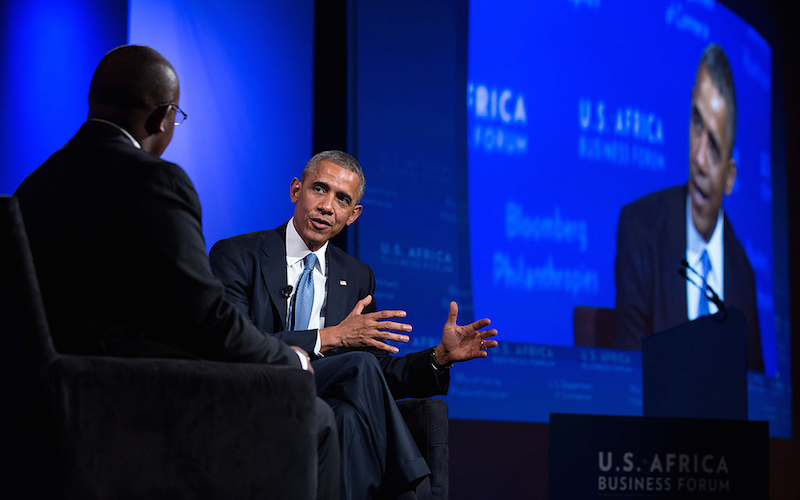
Africa’s Future in the Global Economy
On October 20-21, 2014 the Council of American Ambassadors and the Hinckley Institute of Politics co-sponsored a conference on Africa’s Future in the Global Economy at the University of Utah. Global leaders and academics made presentations to an audience consisting of government and community leaders, diplomats, former U.S. ambassadors, educators and students. Governor Gary Herbert opened the conference noting that a number of Utah businesses have increased their trade with Africa–a new frontier for export growth. TIME’s October 27 issue had a Gallup poll survey taken in 131 countries, indicating that 35% of the respondents planned to do business in sub-Saharan Africa within the next year; 23% in the Middle East and North Africa.
Assistant Secretary of State for African Affairs Linda Thomas-Greenfield gave an overview of U.S. involvement in sub-Saharan Africa—major achievements and some shortcomings. The future looks bright, except some of the Millennium Development Goals established at the UN in 2000–eight targets to eradicate poverty and human suffering–will not be accomplished by 2015. Ms. Thomas-Greenfield served as U.S. ambassador to Liberia 2008-2012, where today there is an Ebola crisis that is also affecting several other West African nations.
Ambassador John Campbell, who served in Nigeria 2004-2007, gave an insightful overview of the country’s political history, and the rise of the Boko Haram terrorist group that has destabilized the northern region, bent-on creating an Islamic state. The government has squandered Nigeria’s oil wealth, which could have been used to improve people’s lives in both the Muslim north and Christian south. Without investing in its people the religious divide will only increase more conflict.
Colonel John Garrett a former U.S. Marine, who served in Vietnam, Desert Shield/Desert Storm, and commanded the withdrawal of the multi-national force from Mogadishu, Somalia in 1993, after UN Peacekeepers were attacked by Islamist militias, now works closely with the U.S. AFRICA COMMAND (AFRICOM) on issues regarding Islamist groups that are destabilizing the Sahel region; reaching into North Africa where Libya is under siege by Islamist militias.
He discussed his role as a security consultant to governments and businesses on protection measures. The concern is the focus being given by the international community to counteract the Islamists expansion. This could ultimately affect the economic viability and growth of the region.
Michael Leavitt, former Utah Governor and Secretary of Health and Human Services (HHS) in the Bush administration, discussed global health issues, and the current Ebola outbreak which could become a global epidemic. He noted that infectious diseases occur almost every thirty years, but this one has been magnified by the media in an election year. A coalition of medical experts could have been formed last March when the first outbreak occurred in Liberia. Today Liberia, Sierra Leone, and Guinea have numerous cases, with the virus spreading in epidemic proportions. “Africa is in crisis over Ebola. It has the potential to reshape the continent economically and politically. Our most important public health priority is to stop the spread of Ebola in Africa. This is one of the rare places where our short term domestic well-being inside the United States is perfectly aligned with a long term foreign policy objective. Health diplomacy in this case serves both purposes. In helping stop the spread of Ebola we are not only protecting our own people, we advance American foreign policy interests on an emerging continent,” Governor Leavitt noted.
Dr. Daniel Bausch, head of Virology and Emerging Infections at the U.S. Naval Research Unit 6, Lima, Peru, and associate professor of Tropical Medicine at Tulane School of Public Health, discussed how the Ebola virus spread, and related medical facts. Having worked in West Africa and dealing with this disease he discussed how to stop the spread of the virus, and dealing with the people already infected. There is an urgency to keep the disease from reaching our shores. The problem is that the poor countries most affected are the ones with the least developed health infrastructure. Their porous borders only add to the quick spread of the disease.
Ms. Rosa Whitaker, Chief Executive of The Whitaker Group, is one of the foremost experts on Africa trade, investment and economic cooperation. As assistant U.S. Trade Representative for Africa, in the Clinton and Bush administrations, she co-authored the African Growth and Opportunity Act of 2000 (AGOA), which allows duty free access to U.S. markets for most products manufactured in Africa. Exports to the U.S. under AGOA have increased almost four-fold since inception—a great economic benefit to the forty-one qualifying countries.
The AGOA has generated 350,000 direct jobs in Africa, one million indirect jobs, and 100,000 jobs in the United States. Ms. Whitaker noted that the U.S. has also benefited since two-way trade reached $63 billion in 2013. She noted that the companies in her portfolio have infused hundreds of millions in foreign direct investments in sub-Saharan Africa, which has added thousands of jobs.
Dr. Joshua Eisenman, assistant professor at the University of Texas, Lyndon Baines Johnson School of Public Affairs, and senior fellow for China Studies at the American Foreign Policy Council, gave an overview of China’s political agenda in Africa—and its thirst for Africa’s rich resources. China uses its capital to gain access at every economic level, from agriculture to diamonds. African leaders, desperate for foreign direct investments, eagerly succumb to China’s largesse. China has been building relationships in sub-Saharan Africa since the 1950’s. Today China has a presence in almost every country, mainly for the extraction of resources. With its own burgeoning population, three million Chinese have already relocated to sub-Saharan Africa which is expected to reach 30 million by 2050.
Robert Bennett, former U.S. Senator from Utah, gave a global perspective of the evolving geopolitical issues in Europe, Middle East and Africa. The instability that exists in many parts of the world has affected the quality of life for millions of people. In spite of the challenges of the post-colonial era in Africa, the continent shows great promise for the future. The U.S. has instituted numerous health and aid programs, including food security, and is involved in combating infectious diseases. Africa will succeed over time, and take its rightful place on the global economic stage, Senator Bennett noted: “Trade is worth five times more than aid.”
Stephen Hayes, Chief Executive of the Corporate Council on Africa (CCA), represents numerous businesses operating in Africa, predominantly in the energy sector. Mr. Hayes noted that the U.S. is losing trade opportunities to China. Especially concerning is the slow pace in which the U.S. is expanding trade relations with the African countries. China’s trade hit a record of $200 billion in 2013, from just $6 billion in 2001. China has lifted tariffs on 60% of the goods imported from African countries. Mr. Hayes noted that CCA’s goal is to increase and support U.S.-Africa economic engagement.
Former U.S. Ambassador Delano Lewis, who served in South Africa 1999-2001, moderated a panel on Investing in Africa, which included businessman James L. Sorenson, Chairman of Sorenson Impact Foundation which has incubated several African businesses including SKS Microfinance that employs 22,000 and has 2,029 branches, with over 6,247,000 clients. To make payments on loans easier he formed M-Pesa, a mobile money solution, which has 18 million customers. Mr. Sorenson said his mission in sub-Saharan Africa is to “accelerate and advance the understanding and application of the principles of free enterprise to create scalable and sustainable global societal change.” Investments to date have been made in Kenya, Ghana, and Liberia.
Ms. Laura Geritz, lead portfolio manager of the Wasatch Frontier Emerging Small Countries Fund, indicated she has made a number of investments in Africa: “I like the true frontier and emerging small countries with great secular opportunities from young, ambitious labor forces…like many countries in sub-Saharan Africa.” She noted that China’s success will lead to increased labor costs, which will potentially give the poor countries the opportunity to take market share from China’s basic manufacturing sector. The increase in foreign direct investments in Africa is a positive sign of confidence in its future. Sub-Saharan Africa is moving beyond the commodities realm–into basic industries. Recent media reports on the Ebola crisis has become a concern, although none of the outbreaks have taken place in the countries in which the fund invests, Ms. Geritz noted.
Marshall Wright, director of business development in the Utah Governor’s office, noted that the keys to Africa’s growth and success will be the development of badly needed infrastructure and information technology. Today people still have difficulty getting their goods to commercial markets. Electricity for businesses to operate is also critical, as are wireless networks for internet access. The panel agreed that foreign direct investments would readily f low into sub-Saharan Africa, if the necessary infrastructure is in place.
Utah Senator Orrin Hatch noted the role the U.S. could play in securing a more prosperous future for Africa. As the Ranking Member on the U.S. Senate Finance Committee with jurisdiction over trade policy, he noted that Africa continues to be an important region for trade since it has a fast-growing middle class–increasing from 60 million to 100 million people by 2015. “The African Growth and Opportunity Act (AGOA) has become the cornerstone of our trade and investment relationship with sub-Saharan Africa.” As a key supporter Senator Hatch is taking the lead in its renewal in 2015, noting that a timely renewal of the AGOA needs to be a high priority for Congress. He said trade with the beneficiary countries had more than tripled and direct investments in Africa have grown six-fold–creating more than a million jobs. “However our efforts to increase trade with Africa are falling short of their potential.”
The colonialists at independence left the African nations ill-prepared for the future, with the irrational borders that separated tribes, religions and cultures. Pan-African leaders were also not groomed for the task that lay ahead. Little has changed for many Africans today, with 40 % still living on less than $2 a day. Africa has six of the ten fastest growing economies, yet poverty, education, healthcare and jobs are still major concerns. Child birth, infant mortality and eradicating infectious diseases also still need more attention. With 15% of the world’s population Africa represents only 2.7% of the world’s total GDP. Five countries in sub-Saharan Africa represent 44% of the total GDP, with South Africa and Nigeria accounting for over 33% of the economic market. China has surpassed the U.S. as Africa’s largest trading partner, reaching over $200 billion in 2013, and projected to reach $400 billion by 2020. The African countries need to develop a value-added manufacturing component to minimize the outflow of their raw materials and natural resources, a major step in attaining self-reliance.
Former President Karl Offmann of Mauritius stated in 2005 that “Africa should do for itself, and not look for charity.” You start small, taking one step at a time, and build your country’s economy as Mauritius has done, relying on its people as the country’s resource, emphasizing, that many small projects together would build into bigger ones. “African nations should not look to others to solve the continent’s problems. Africans should take control of their own economic destiny.”
A Pan-African vision for the future of Africa was published recently by the African Union Commission entitled, “Agenda 2063: The Africa We Want,” which lists goals for “an integrated, prosperous and peaceful Africa, driven by its own citizens and representing a dynamic force in the global arena.” In the recent conference on Africa’s Future in the Global Economy, the presenters clearly stated that Africa has a bright future. The United States can be the catalyst for Africa reaching its economic potential.
